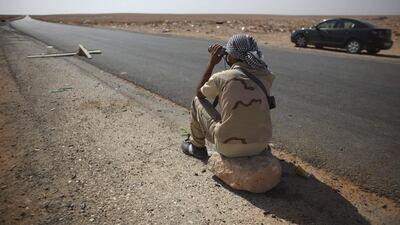Bani Walid is a mountainous town about 180 kilometres south-west of Tripoli. It is home to Libya’s largest tribe, Warfalla. The town and its residents take pride from their “counter-revolution” position despite appearing to be on the wrong side of history in 2011. Then it was classified as a pro-regime town, although most of its people believed they were pro-Libya not pro-Qaddafi.
Today the town is militia-free and despite being invaded and crushed in 2012 on the orders of the defunct General National Congress, Bani Walid has risen from the ashes and become one of Libya’s safest and calmest towns. Unlike other parts of the country, no arms are on display and no militia operates.
Since 2013 Bani Walid has been the destination for hundreds of families who have been displaced from all over the country in one of the many aimless battles fought since the former regime was toppled with Nato help in 2011.
Sidelined by Libya’s new government because of its reputation as supporter of the former regime, the town’s elders took the initiative and set up the Social Council of Warfalla Tribes (SCWT), a collective leadership organisation made up of 60 members representing the nearly 52 clans that make up Warfalla. Decisions are usually taken in a democratic manner through voting and consensus.
SCWT is a de facto power broker and the main authority in this tribal community where arguments are settled through negotiations.
However, it has recently faced a rise in unusual crimes, including extortion and kidnapping, so the council has had to change its tactics. In late 2014, it set up a collective volunteer security force known as Al Saria. It is a civilian force made up of volunteers meant to safeguard the town and fight crime in a country that lacks a central government and proper policing.
Fawzi, an Al Saria commander, told me that “faced with such crimes that we’d never known before, the council had to act and we had to answer the call”.
Fawzi owns a cafe, just across the road from Al Sari’s headquarters. While he is on duty, his younger brother manages the cafe. His older brother Ahmed, a former military officer, commands the detention centre where criminals are interrogated by retired professional police officers. Aware of the tribal sensitivities within the community, SCWT has given Al Saria its full backing. Since almost all people know each other, the decision to arrest someone is communicated through SCWT, which passes it on to the person’s tribal representative within the council thus eliminating any potential tribal intervention. Most tribes automatically disown any member implicated in a serious crime such as murder or kidnapping.
While no official crime rate figures are available, the community is generally satisfied with the security situation and willing to support Al Saria.
Bani Walid is now a beacon of peace and security, and the town of choice for anyone seeking shelter and safety. In September alone, the town welcomed 200 families fleeing Sirte, 300km north-east, after ISIL took the city. Many families from Tawergha still live in Bani Walid since the town was destroyed by Nato-supported rebels in 2011. One such family has been living in my old family home west of Bani Walid for the past four years.
The SCWT is headed by Dr Salah Maeuf, a Bani Walid native who teaches history at the local university. He is supported by a team of experts in political science and other disciplines. The council is attempting to influence the political process nationwide.
In his home west of town, Dr Maeuf told me: “We are trying to make the rest of the Libyan tribes realise that no one will come to Libya’s rescue unless its people rise up to the challenge.” He strongly believes that the United Nations-proposed political settlement is “doomed, since it does not have the support of Libya’s tribes who can make or break any political deal”.
In the meantime, he said: “Our primary concern is to keep our town as safe as possible and as a national showcase for others that we Libyans can rescue our country.” Almost every week the council receives delegations from other cities across Libya who come to see how the town’s experiment in self-government works.
What the SCWT lacks is media exposure and international reach. While there are television and radio channels that support it, they are limited in reach and lack funds and technical expertise. The council has not been active outside Libya as a matter of principle, because it believes that foreign inference is the problem.
While many cities and towns across Libya lack security and proper government, Bani Walid is succeeding on a local level, and serving as a possible model as Libya tries to develop a national salvation agenda and rebuild the war-ravaged country.
Mustafa Fetouri is an independent Libyan academic and journalist who lives in Belgium

